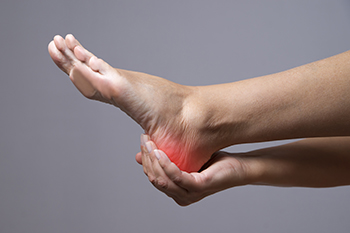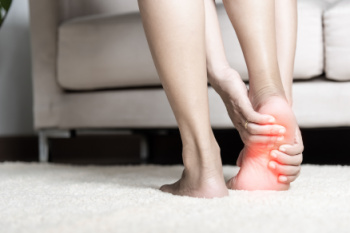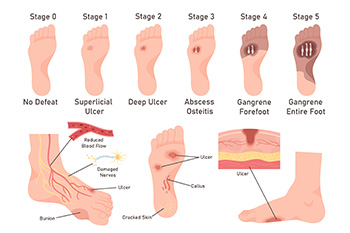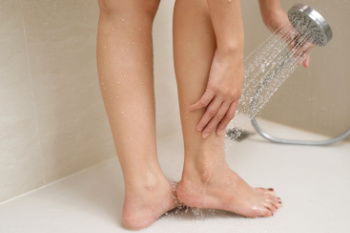Connect With Us
Blog
September 2024

Heel spurs are bony growths that form on the underside of the heel bone, often resulting from long-term strain on the foot’s ligaments and tendons. They can be quite painful, typically resulting in a sharp, stabbing sensation in the heel, especially with the first steps in the morning or after prolonged periods of rest. Symptoms also include tenderness and swelling around the heel area. Treatment options for heel spurs include wearing supportive shoes with cushioned insoles, performing stretching exercises to alleviate tension in the foot, and using orthotic devices to correct alignment issues. In some cases, pain relief or anti-inflammatory medications may help manage discomfort. If you think you have heel spurs, it is suggested you make an appointment with a podiatrist who can provide a personalized treatment plan and address underlying issues.
Heel spurs can be incredibly painful and sometimes may make you unable to participate in physical activities. To get medical care for your heel spurs, contact one of our podiatrists from Greater Boston Foot Care, PLLC. Our doctors will do everything possible to treat your condition.
Heels Spurs
Heel spurs are formed by calcium deposits on the back of the foot where the heel is. This can also be caused by small fragments of bone breaking off one section of the foot, attaching onto the back of the foot. Heel spurs can also be bone growth on the back of the foot and may grow in the direction of the arch of the foot.
Older individuals usually suffer from heel spurs and pain sometimes intensifies with age. One of the main condition's spurs are related to is plantar fasciitis.
Pain
The pain associated with spurs is often because of weight placed on the feet. When someone is walking, their entire weight is concentrated on the feet. Bone spurs then have the tendency to affect other bones and tissues around the foot. As the pain continues, the feet will become tender and sensitive over time.
Treatments
There are many ways to treat heel spurs. If one is suffering from heel spurs in conjunction with pain, there are several methods for healing. Medication, surgery, and herbal care are some options.
If you have any questions feel free to contact our office located in Plymouth, MA . We offer the latest in diagnostic and treatment technology to meet your needs.

Diagnosing heel pain in adults involves a thorough evaluation by a podiatrist to determine the underlying cause. Common conditions include plantar fasciitis, which causes pain on the bottom of the heel, and Achilles tendinitis, which affects the back of the heel. Other possibilities include heel spurs, bursitis, or stress fractures. Diagnosis typically starts with a detailed medical history and physical examination, assessing factors like foot structure and gait. Imaging tests, such as X-rays or MRI scans, may be used to identify structural issues or rule out other conditions. Blood tests might be conducted if an inflammatory or systemic condition is suspected. Accurate diagnosis is important for effective treatment, which could include orthotics. If you have heel pain, it is suggested that you schedule an appointment with a podiatrist who can tailor an approach for addressing your specific problem.
Many people suffer from bouts of heel pain. For more information, contact one of our podiatrists of Greater Boston Foot Care, PLLC. Our doctors can provide the care you need to keep you pain-free and on your feet.
Causes of Heel Pain
Heel pain is often associated with plantar fasciitis. The plantar fascia is a band of tissues that extends along the bottom of the foot. A rip or tear in this ligament can cause inflammation of the tissue.
Achilles tendonitis is another cause of heel pain. Inflammation of the Achilles tendon will cause pain from fractures and muscle tearing. Lack of flexibility is also another symptom.
Heel spurs are another cause of pain. When the tissues of the plantar fascia undergo a great deal of stress, it can lead to ligament separation from the heel bone, causing heel spurs.
Why Might Heel Pain Occur?
- Wearing ill-fitting shoes
- Wearing non-supportive shoes
- Weight change
- Excessive running
Treatments
Heel pain should be treated as soon as possible for immediate results. Keeping your feet in a stress-free environment will help. If you suffer from Achilles tendonitis or plantar fasciitis, applying ice will reduce the swelling. Stretching before an exercise like running will help the muscles. Using all these tips will help make heel pain a condition of the past.
If you have any questions please contact our office located in Plymouth, MA . We offer the newest diagnostic and treatment technologies for all your foot and ankle needs.

Diabetic foot ulcers are open sores that typically form on the bottom of the feet in individuals with diabetes. These ulcers progress through several stages, each requiring careful management. In the initial stage, the skin breaks down, often due to minor injuries or pressure. As the ulcer develops, it can deepen, affecting the underlying tissue and potentially reaching the muscle or bone. At advanced stages, infection sets in, leading to serious complications like gangrene, which may necessitate amputation. Seeking early treatment is critical because the earlier the intervention, the better the chances of preventing progression. Early treatment can stop the ulcer from worsening, reduce the risk of infection, and promote faster healing. If you have diabetes, it is strongly suggested that you schedule regular appointments with a podiatrist to stay on top of any developing foot problems and prevent complications, as well as to help maintain mobility and quality of life.
Diabetic foot care is important in preventing foot ailments such as ulcers. If you are suffering from diabetes or have any other concerns about your feet, contact one of our podiatrists from Greater Boston Foot Care, PLLC. Our doctors can provide the care you need to keep you pain-free and on your feet.
Diabetic Foot Care
Diabetes affects millions of people every year. The condition can damage blood vessels in many parts of the body, especially the feet. Because of this, taking care of your feet is essential if you have diabetes, and having a podiatrist help monitor your foot health is highly recommended.
The Importance of Caring for Your Feet
- Routinely inspect your feet for bruises or sores.
- Wear socks that fit your feet comfortably.
- Wear comfortable shoes that provide adequate support.
Patients with diabetes should have their doctor monitor their blood levels, as blood sugar levels play such a huge role in diabetic care. Monitoring these levels on a regular basis is highly advised.
It is always best to inform your healthcare professional of any concerns you may have regarding your feet, especially for diabetic patients. Early treatment and routine foot examinations are keys to maintaining proper health, especially because severe complications can arise if proper treatment is not applied.
If you have any questions please feel free to contact our office located in Plymouth, MA . We offer the newest diagnostic and treatment technologies for all your foot and ankle needs.

Everyday foot care is vital for maintaining overall foot health and preventing common issues. Wearing comfortable, well-fitting shoes is important as they support and protect the feet from stress and injury. Regular walking helps maintain healthy circulation and keeps the feet flexible. Washing your feet daily with mild soap and water is important to remove dirt and sweat, reducing the risk of infections and unpleasant odors. Additionally, wearing clean socks made of breathable materials helps to keep feet dry and helps prevent fungal infections. Conditions that affect the feet, including foot odor, cracked skin, corns, and ingrown toenails, may be prevented by incorporating daily foot hygiene practices. If you have developed a foot condition, it is suggested that you consult a podiatrist who can treat various foot ailments and educate you on effective everyday foot care methods.
Everyday foot care is very important to prevent infection and other foot ailments. If you need your feet checked, contact one of our podiatrists from Greater Boston Foot Care, PLLC. Our doctors can provide the care you need to keep you pain-free and on your feet.
Everyday Foot Care
Often, people take care of their bodies, face and hair more so than they do for their feet. But the feet are a very important aspect of our bodies, and one that we should pay more attention to. Without our feet, we would not be able to perform most daily tasks.
It is best to check your feet regularly to make sure there are no new bruises or cuts that you may not have noticed before. For dry feet, moisturizer can easily be a remedy and can be applied as often as necessary to the affected areas. Wearing shoes that fit well can also help you maintain good foot health, as well as making it easier to walk and do daily activities without the stress or pain of ill-fitting shoes, high heels, or even flip flops. Wearing clean socks with closed shoes is important to ensure that sweat and bacteria do not accumulate within the shoe. Clean socks help to prevent Athlete’s foot, fungi problems, bad odors, and can absorb sweat.
If you have any questions please feel free to contact our office located in Plymouth, MA . We offer the newest diagnostic and treatment technologies for all your foot and ankle needs.

